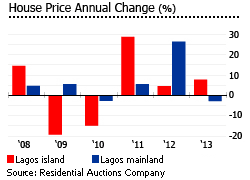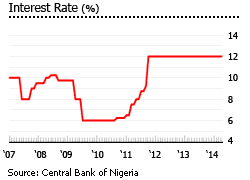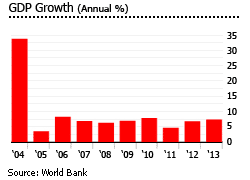Wealthy mansions abound in Nigeria, while the poor go without housing
Nigeria is an amazing mess, fifteen years after the re-establishment of democracy, and 54 years after independence.
Corruption reigns from the presidency downwards. US$20 billions of revenue disappeared over 18 months from the Nigerian National Petroleum Corp., according to ex-central bank governor Lamido Sanuisi. The northeast is in thrall to the Islamist terror organization Boko Haram. The police are abusive, violent, and corrupt. Power cuts are frequent, the roads ill-maintained. The press is under threat. The president systematically impeaches opposition governors. The south periodically wonders whether it should separate from the chaotic north.
Colonized by the British, Nigeria gained its independence in 1960. The country’s oil industry boomed in the 1970s, making Nigeria Africa's largest oil exporter. But with the world recession of the 1980s oil prices plunged, leading to a cycle of massive debt, soaring inflation, and large-scale unemployment. The oil price is now surging again, but little trickles down to the masses.
61% of Nigerians lived on less than a dollar a day in 2010, up from 52% in 2004, according to the Nigerian National Bureau of Statistics (NBS).
Nigeria’s fast-expanding urban population is ill-housed. In major centres such as Lagos, Abuja, Ibadan and Kano housing demand is growing at about 20% per year. Yet Nigeria’s housing and construction sector only accounts for only 3.1% of GDP, according to Finance Minister Ngozi Okonjo-Iweala.
Demand outstrips supply even in Nigeria's high-income housing market. The country has limited lots under formal title and even quality housing can often not be mortgaged, so that the formal housing market serves only the minority, according to Centre for Affordable Housing Finance in Africa (CAHF).
Housing construction is about 100,000 units per year for a country of over 170 million – the largest population in Africa. According to the World Bank, the country has a housing deficit of about 17 million units and needs about 700,000 additional units each year for the next 20 years.
House prices surging in Lagos

On Lagos mainland, average prices rose by a whopping 26.53% in 2012, but then fell back by 2.77% in 2013 – a sort of cooling effect after the increase of 2012, according to Residential Auctions Company (RAC).
On the other hand, average house prices in the high-end Lagos Island market increased 7.71% to N223 million (US$1.37 million). The Lagos Island market has experienced continuous rises in average asking prices over the last three years, with surging demand for luxury houses, particularly from investors and high-income individuals.
Why is Nigeria's property market such a mess?
There are three main structural reasons for the state of Nigeria's property market1. Property registration is expensive
According to Nigeria’s Land Use Act of 1978, ownership rights for land are vested in the office of the Governors of various State Governments. Land titles are prone to political interference because of the vast powers of governors over state land allocation.
Bottlenecks inevitably arise in the property transfer system due to Nigeria’s federal structure.
Another hindrance is that 65% to 70% of land is still held under customary title. Even in areas where title deeds are more common, there can be difficulties in clarifying who actually holds title to the land. This title uncertainty often means endless challenges in court.
Nigeria is among the worst globally when it comes to registering property, according to the World Bank’s Doing Business 2013 report, which ranks it 182nd out of 185 countries. The registration process can last as long as 6 months to 2 years, taking an average of 12 procedures, and costing about 20.8% of the value of the property.
Neighboring Ghana only requires 5 procedures, 34 days and 1.3% of the property value. The cost of registering property in Nigeria is double the average for Sub-Saharan Africa and five times the OECD average. In South Africa, similar land registrations are completed in much shorter times and cost only 6% of the property value.
2. Housing construction handicapped by high costs
Building a house is very expensive in Nigeria. A three-bedroom house, for example, will cost about US$50,000, compared to US$36,000 in South Africa and US$26,000 in India, according to Finance Minister Ngozi Okonjo-Iweala.
The cost of construction is high for three reasons: high costs of building materials, high skilled labour costs, and costs associated with poor roads and sewerage systems.
About 75% of dwellings in Nigeria’s urban areas are built of concrete. Cement prices in Nigeria are about 30-40% higher than in neighboring countries and world market prices. The lack of public infrastructure adds as much as 30% to the total costs of the development.
3. Few can access mortgage finance
Most Nigerians rely on private savings to pay for their homes. Only about 5% of the 13.7 million housing units in Nigeria are financed with a mortgage, and the mortgage debt to GDP ratio is only about 1%, and mortgage loans account to less than 1% of commercial banks' total assets. Nevertheless Nigeria had 82 primary mortgage banks (PMBs) as of December 2012, 21 commercial banks, four discount houses, two merchant banks, 66 finance companies, 882 microfinance banks, five development finance institutions, and 2,278 exchange bureaus, according to the Central Bank of Nigeria.
Nigeria’s Federal Mortgage Bank also manages a National Housing Fund financed mostly by contributions from public sector workers. But as of August 2012, only about 12,000 mortgages had been provided for a total of 3.8 million eligible contributors.
Housing development agencies in various state governments also have had very limited impact.
According to the Global Financial Inclusion (Global Findex) Database, launched by the World Bank in 2012, 30% of Nigerians over the age of 15 have an account at a formal financial institution. Surprisingly, only 2% of Nigerians over 15 years old have a loan from a financial institution, and a meagre 0.6% have an outstanding loan for home purchase. Loans for home construction are more common, although still miniscule, at 1.7% overall.
“The ecosystem for residential investment development still remains relatively broken… The lack of affordable mortgages is a major challenge, a major deterrent, a major hindrance to the development of residential properties in this market,” said Michael Chu'di Ejekam, Director of Nigerian Real Estate at Actis, a London-based private equity firm.
Nigerians are turning to rented accommodation
According to a report by RAC, 60-65% of business professionals in Lagos live in rented accommodation due to the high cost of home ownership and the unavailability of suitable mortgage products.
The rental market is highly cyclical, like the buying market.
Lagos Island
In 2012 Lagos Island asking rents rose significantly, with asking rents for a 4-5 bedroom single family unit climbing 28.4% to N7,158,333 (US$44,201), while the average rent for a 3 bedroom multi-family unit was up 17.7% to N6,889,167 (US$42,539), according to RAC’s report.
- In Ikoyi the average asking rent on a 3 bedroom apartment rose by 13% in 2012, to N10,167,500 (US$62,782). The average asking rent on a single family unit was N10,525,000 (US$64,989), a rise of 50.4%.
- On Victoria Island, the average asking rent on a 3 bedroom apartment increased by 28.3% in 2012, to N7,700,000 (US$47,546) in 2012. But asking rents on single family units have remained flat, with only a 4.2% rise.
In Lekki Phase 1, the average asking rent on a 3 bedroom apartment was up 9.6% in 2012, to N2,800,000 (US$17,289). In contrast, average rents on a 4-5 bedroom single family unit were only up 3.9%, to N4,700,000 (US$29,021).
However these rent rises were really a rebound. In 2011, Lagos Island rents had plummeted – with single family unit asking rents falling 25.0%, and multi-family rents falling 8.8%.
Lagos Mainland
Lagos Mainland asking rents rose sharply in 2012 as the market rebounded. The average asking rent on a 4-5 bedroom single family unit increased by 29.7%, to N2,510,595 (US$15,502). The average asking rent on a 3 bedroom multi-family unit increased by 49.9% y-o-y to N1,308,750 (US$8,081).
Lagos Mainland had a slow year in 2011, with average asking rent for single family units falling 9.9%, while multi-family unit asking rents fell 2.7%.
Yields in Lagos are moderate
The average yield on residential property for Lagos Mainland is estimated at 4.30% per annum, while the average yield on Lagos Island is estimated at 3.64% per annum,according to the RAC. Yields were significantly higher on the Lagos Mainland except in 2010, when Lagos Island yields were marginally higher.
Interest rates at record high to curb pre-election inflation

The Central Bank of Nigeria has maintained its key interest rate at 12% since October 2011.
Although the 12% interest rate has helped to bring inflation down to the lowest level in more than five years, the central bank may increase borrowing costs if government spending surges this year, warns Central Bank Governor Lamido Sanusi.
Insurgencies have hit the north's property market
The Islamist insurgency in Nigeria started in 1999 with the establishment of Sharia law in several Muslim-majority states in the north. Tensions between Christians and Muslims have resulted in thousands of killings, with deaths sharply increasing in recent years as conflict between the Islamic group Boko Haram and the secular government continues to grow. Terrorist activities and insurgency have scaled up in recent times – as seen in the abduction of 200 high school girls in the Borno state. More than 1,500 people have been killed by Islamists just this year, according to Amnesty International.
The Muslim-Christian clashes have hit Northern Nigeria’s property market. Many residents in widely attacked areas and known terrorist hotspots (like Maiduguri, the Borno State capital, Yobe and Adamwa) have fled to other parts of the northern region, while some have left the region for good.
“Unarguably, people are moving down south. The insurgency is really affecting the construction industry negatively, though there are other factors like the upcoming general elections. Property values have gone down considerably because demand is very low,” said Fred Akinloye, former chairman of Nigerian Institution of Estate Surveyors and Valuers (NIESV) Kano State Chapter.
Security threats have resulted in loss of investment appetite by real estate investors and continue to hamper growth and housing delivery in the property market. “The property market remains the major victim of the insurgency up north and vacancy rate is as high as 30 percent in Yobe, Adamawa, Borno, Katsina and Kano,” according to online newspaper BusinessDay.
Efforts to spur housing sector: Nigerian Mortgage Re-Financing Company launched, January 2014
In 2000, the government implemented a number of reforms to stimulate the housing sector. These included establishing the Real Estate Developers Association of Nigeria and the Ministry of Lands, Housing and Urban Development, as well as restructuring the housing finance system through the Federal Mortgage Bank of Nigeria (FMBN).
Computerized land registries have also been introduced in Lagos and Abuja to address the lengthy registration process. In August 2010, the governor of Lagos State also signed a bill establishing the Lagos State Mortgage Board whose mandate is “to generate an environment that enables access to mortgage finance”.
Moreover, a National Housing Policy was adopted in December 2011 to ensure that all “Nigerians own or have access to decent, safe and sanitary housing in healthy environment with infrastructural services at affordable cost, with secure tenure.” Separate chapters deal with land for housing, housing finance, housing maintenance, building materials and construction workforce, social housing, and management information systems.
In 2012, President Goodluck Jonathan convened a Roundtable on the Housing Sector which brought together key stakeholders. The Roundtable prompted the government to establish a Housing Finance Programme Committee, chaired by the Finance Minister, tasked with developing a facility that would significantly improve Nigerians’ access to mortgages. The Nigeria Mortgage Re-finance Company (NMRC) is the outcome.
Established with US$300 million from the World Bank, the NMRC is a re-financing institution providing mortgage lending banks with increased access to liquidity and long-term funds.
Nigerian officials hope the NMRC will encourage property developers to cater to more than just the high-end market. Based on World Bank estimates, NMRC should be able to deliver more than 75,000 new homes per year and generate 300,000 direct and 488,000 indirect jobs during the initial phase of the program. President Jonathan officially launched the NMRC in January 2014 in Abuja, and the company is now in operation.
Others are sceptical. “There’s little incentive or money for private developers to provide low-cost housing… The cost of the land, the cost of what an average individual expects to have in terms of square footage in a number of rooms, none of it makes commercial sense,” according to Knight Frank’s Peter Welborn.
Rebasing shows Nigeria is Africa’s biggest economy

Nigeria’s economy is now visibly the largest in Africa after it “rebased” its gross domestic product (GDP) to N80.3 trillion (US$509.9 billion). That compares with South Africa’s GDP of US$370.3 billion at the end of 2013. GDP growth stood at 7.3 in 2013, after growth 6.8% in 2012, 4.6% in 2011, 7.8% in 2010, and 7.3% average growth 2003-2010.
While the revised figure makes Nigeria the 26th biggest economy in the world, the country lags behind in terms of income per capita, with US$2,688 for each citizen. On a per-capita basis, South Africa’s GDP is three times higher than Nigeria’s.